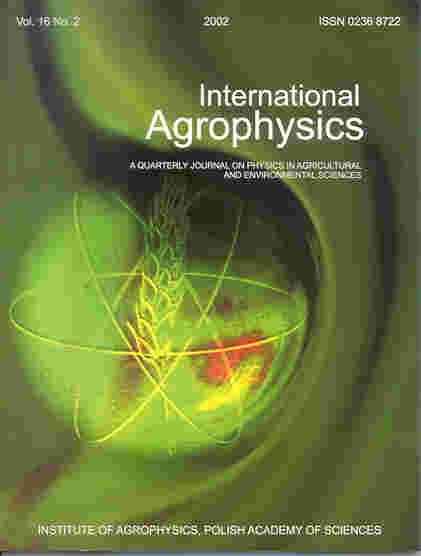|
|
|

|
|
| International Agrophysics |
| publisher: | Institute of Agrophysics
Polish Academy of Sciences
Lublin, Poland |
| ISSN: |
0236-8722 |
vol. 18, nr. 4 (2004)
|
|
|
previous paper back to paper's list next paper
|
|
|
Effect of management practices on soil organic matter, microbial biomass and aggregate stability of Orthic Luvisol
|
|
| (get PDF ) )
|
|
|
Dąbek-Szreniawska M.1, Kuś J.2, Balashov E.3
|
|
|
1 Institute of Agrophysics, Polish Academy of Sciences, Doświadczalna 4, P.O. Box 201, 20-290 Lublin 27, Poland |
|
|
2 Institute of Soil Science and Plant Cultivation, Królewska 1, 24-100 Puławy, Poland |
|
|
3 Agrophysical Research Institute, 14 Grazhdansky Prospekt, St. Petersburg, 195220 Russia |
|
|
vol. 18 (2004), nr. 4,
pp. 311-315
|
|
|
abstract
Because of the importance of soil organic matter (SOM) and wet aggregate stability (WAS) on soil quality, the maintenance of satisfactory levels of these parameters is an integral component of soil management strategy. Our studies were undertaken to assess the effects of organic and monoculture management practices on the relationships of SOM and its labile forms with WAS in a loamy-sandy Orthic Luvisol. The organic management practice (OP) included only manure compost incorporation before potato was planted in a crop rotation with spring barley, red clover for 2 years, and winter wheat. The monoculture management practice (MP) consisted of amendments with mineral fertilizers with continuous winter wheat. Our data showed that OP, as compared to MP, contributed to a greater accumulation of SOM and microbial biomass carbon (MBC) in water-stable aggregates. There were marked management-induced differences in WAS and the distribution of some water-stable aggregate-size fractions. The results of our studies also showed that OP resulted in a higher efficiency of soil microorganisms in utilizing available organic carbon for the formation of new biomass than MP.
|
|
keywords
management practice, organic matter, microbial biomass, aggregation
|
|
|
|
|
|
|